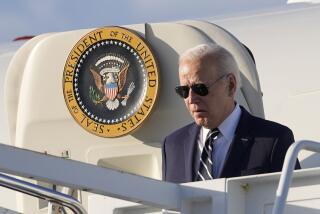Pawlenty, behind in the polls, attacks Obama foreign policy
Former Minnesota Gov. Tim Pawlenty, trailing in the polls that measure the race for the GOP presidential nomination, turned on Tuesday to foreign policy with a sharp attack on President Obama’s Mideast policies and a call to beat back the neo-isolationist wing of his own party.
Speaking at the Council of Foreign Relations, Pawlenty criticized the Obama administration’s response to the series of anti-government protests -- known as the Arab spring -- that have swept through the Mideast. He also argued that the Obama administration had been harsh with Israel and too soft in dealing with Iran and its nuclear ambitions.
“President Obama has failed to formulate and carry out an effective and coherent strategy in response” to the Arab spring, Pawlenty said. “He has been timid, slow and too often without a clear understanding of our interests or a clear commitment to our principles.”
Nor was Pawlenty diplomatic in attacking those in his own party who would seek a return to a less forceful U.S. role in foreign affairs. In a swipe at those who were hesitant about a continuing role for the U.S. military in Afghanistan, Pawlenty said: “Parts of the Republican Party now seem to be trying to out-bid the Democrats in appealing to isolationist sentiments. This is no time for uncertain leadership in either party. The stakes are simply too high, and the opportunity is simply too great.”
Most polls have Pawlenty running in the second tier of GOP presidential hopefuls. Despite campaigning for months, the former governor has had trouble moving up, though he has strong credibility with the media, which generally see him as a more serious challenger than his poll numbers indicate. By turning to foreign affairs, Pawlenty may be hoping to find a constituency he can harness even though polls show that the economy and related issues remain the key determining factors in 2012 electoral cycle.
Foreign affairs is a trickier area since there is a general agreement on U.S. policy abroad; partisan divisions on domestic policy are much sharper. For example, both parties oppose Iran’s nuclear development plans, though they disagree on tactics to prevent the spread of nuclear weapons. Both parties favor democracy, but differ in what the United States should do to foster human rights. That general consensus leaves opponents in the position of attacking Obama more for his style rather than the underlying policy.
To that end, Pawlenty was unsparing on Tuesday, attacking the president for not reacting more strongly when the 2009 elections in Iran led to stormy pro-democracy protests. Obama’s “silence validated the mullahs, despite the blood on their hands and the nuclear centrifuges in their tunnels. While protesters were killed and tortured,” Pawlenty said. Secretary of State Hillary Clinton “and the president waited long enough to see the protesters crushed.”
Pawlenty belittled Obama’s efforts as “engagement” rather than a forceful policy. He said the administration moved too slowly in supporting demonstrators who eventually forced Egyptian President Hosni Mubarak from office and had been too slow in calling for the departure of Syrian President Bashar Assad. “We need a president who fully understands that America never leads from behind,” Pawlenty said.
Obama has repeatedly supported the pro-democracy groups, arguing that rights of assembly and protest should be respected and that governments should not use violence to squelch protests. He also has argued that outsiders cannot solve the internal problems of the Arab countries, though the United States should play a role in helping where needed. He has imposed economic sanctions on countries such as Libya, Syria and Iran, though Pawlenty said that more and better sanctions were needed.
Pawlenty reserved some of his toughest language for the president’s handling of Israeli-Palestinian issues.
This is two-edged sword in the GOP. A strong pro-Israel policy allows a Republican to seek votes from Democrats and among some independents while placating a wing of the GOP, especially evangelicals, who are an important voting bloc in the presidential primaries. Pawlenty minced no words in portraying his policy as more pro-Israel than Obama’s.
“It breaks my heart that President Obama treats Israel, our great friend, as a problem, rather than as an ally,” Pawlenty said. “Today the president doesn’t really have a policy toward the peace process. He has an attitude. And let’s be frank about what that attitude is: He thinks Israel is the problem. And he thinks the answer is always more pressure on Israel.”
Obama, too, has repeatedly said he favors a strong Israel. In discussing the deadlocked peace process, Obama called for negotiations using the 1967 armistice lines as the basis for creating a Palestinian state in talks where both sides would swap pieces of property as needed. That position was condemned by Israeli Prime Minister Benjamin Netanyahu, who lectured Obama in a recent visit to the United States.
Some of Pawlenty’s opponents for the GOP presidential nod have questioned whether Obama is moving too slowly in his plans for withdrawing U.S. troops from Afghanistan.
“It is not wrong for Republicans to debate the timing of our military drawdown in Afghanistan,” Pawlenty said. But he placed himself firmly on the side of those, including some military leaders, who wanted the withdrawal to go more slowly than the president had proposed.
More to Read
Get the L.A. Times Politics newsletter
Deeply reported insights into legislation, politics and policy from Sacramento, Washington and beyond. In your inbox three times per week.
You may occasionally receive promotional content from the Los Angeles Times.







